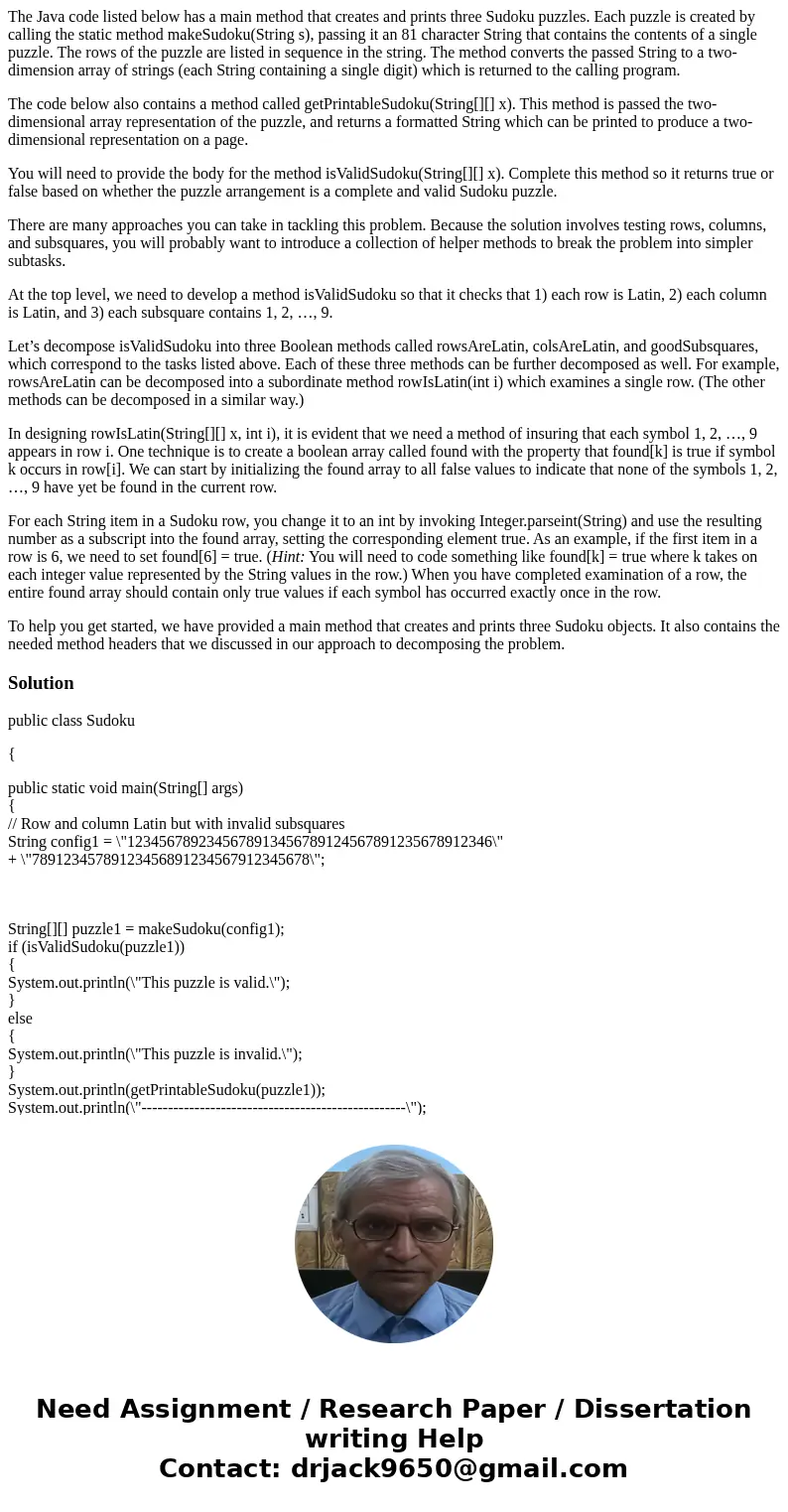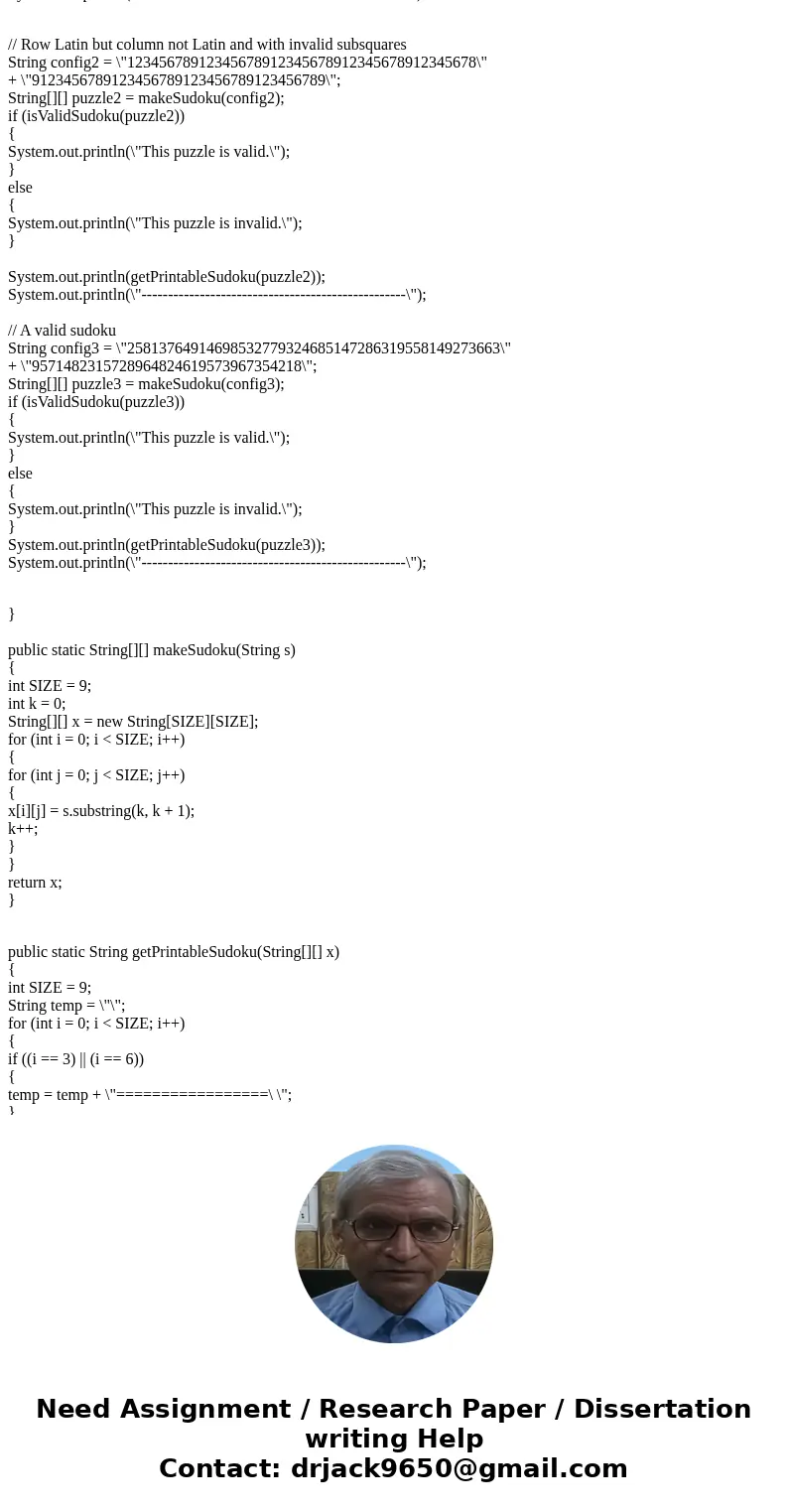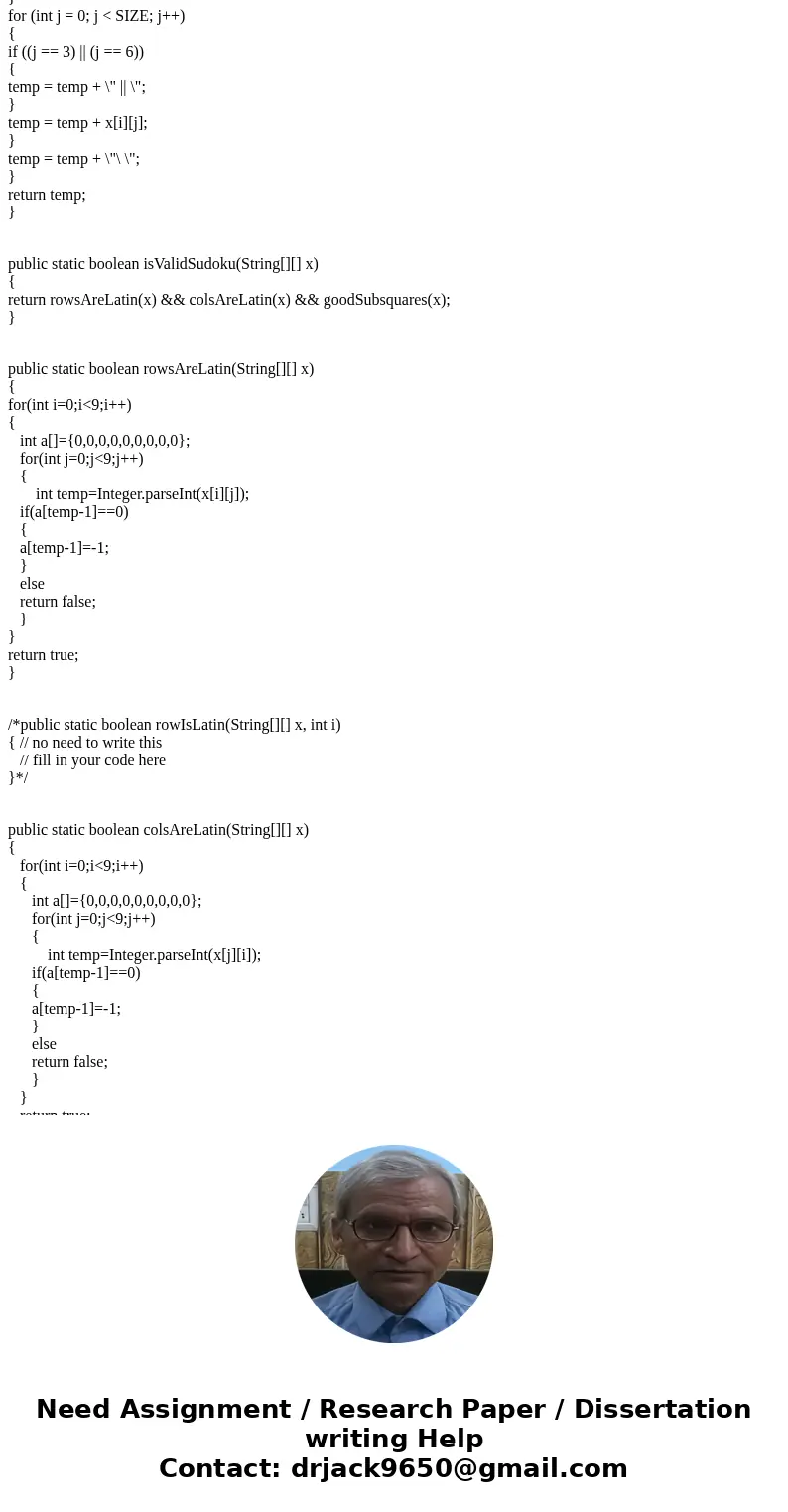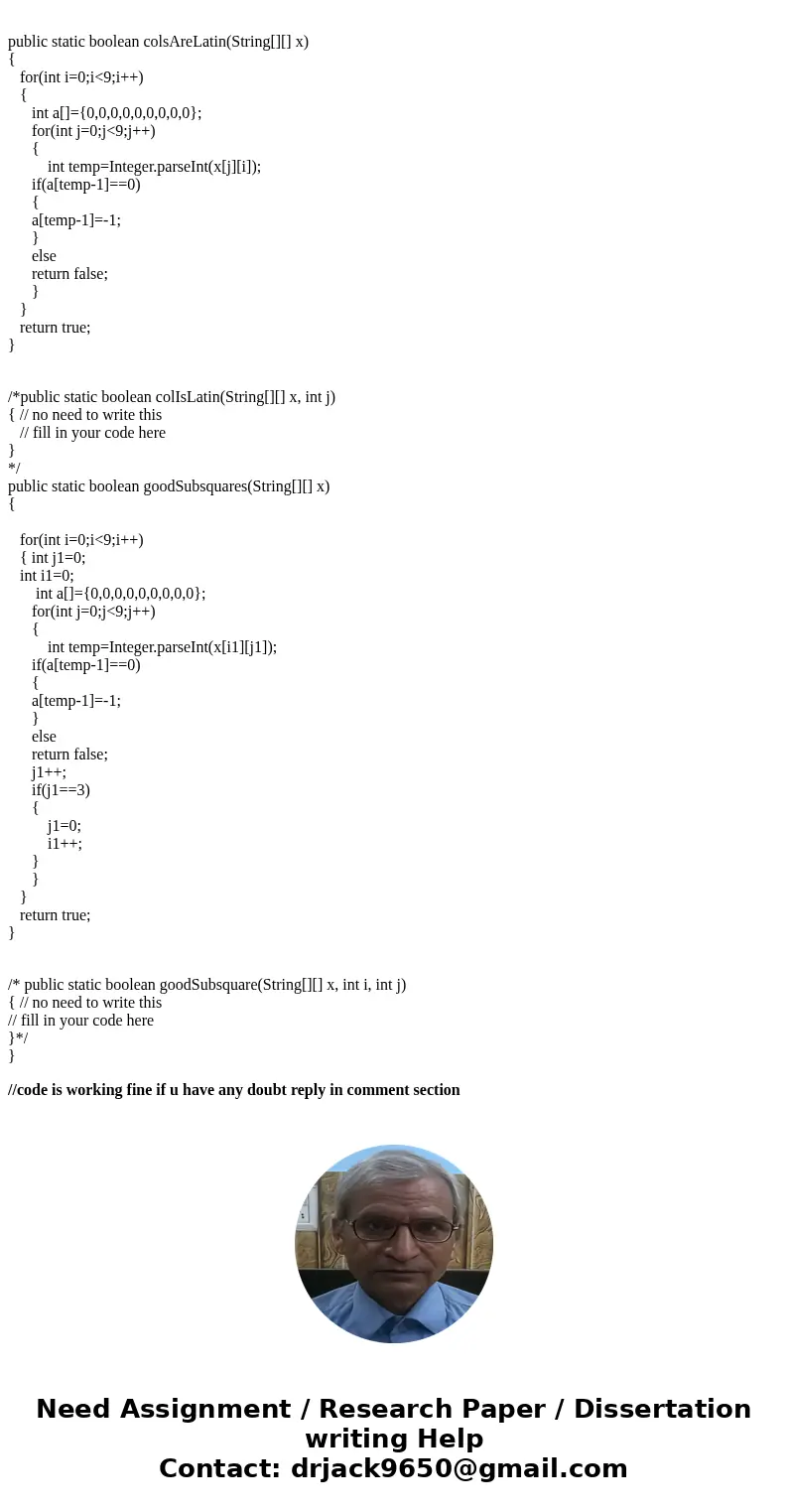The Java code listed below has a main method that creates an
The Java code listed below has a main method that creates and prints three Sudoku puzzles. Each puzzle is created by calling the static method makeSudoku(String s), passing it an 81 character String that contains the contents of a single puzzle. The rows of the puzzle are listed in sequence in the string. The method converts the passed String to a two-dimension array of strings (each String containing a single digit) which is returned to the calling program.
The code below also contains a method called getPrintableSudoku(String[][] x). This method is passed the two-dimensional array representation of the puzzle, and returns a formatted String which can be printed to produce a two-dimensional representation on a page.
You will need to provide the body for the method isValidSudoku(String[][] x). Complete this method so it returns true or false based on whether the puzzle arrangement is a complete and valid Sudoku puzzle.
There are many approaches you can take in tackling this problem. Because the solution involves testing rows, columns, and subsquares, you will probably want to introduce a collection of helper methods to break the problem into simpler subtasks.
At the top level, we need to develop a method isValidSudoku so that it checks that 1) each row is Latin, 2) each column is Latin, and 3) each subsquare contains 1, 2, …, 9.
Let’s decompose isValidSudoku into three Boolean methods called rowsAreLatin, colsAreLatin, and goodSubsquares, which correspond to the tasks listed above. Each of these three methods can be further decomposed as well. For example, rowsAreLatin can be decomposed into a subordinate method rowIsLatin(int i) which examines a single row. (The other methods can be decomposed in a similar way.)
In designing rowIsLatin(String[][] x, int i), it is evident that we need a method of insuring that each symbol 1, 2, …, 9 appears in row i. One technique is to create a boolean array called found with the property that found[k] is true if symbol k occurs in row[i]. We can start by initializing the found array to all false values to indicate that none of the symbols 1, 2, …, 9 have yet be found in the current row.
For each String item in a Sudoku row, you change it to an int by invoking Integer.parseint(String) and use the resulting number as a subscript into the found array, setting the corresponding element true. As an example, if the first item in a row is 6, we need to set found[6] = true. (Hint: You will need to code something like found[k] = true where k takes on each integer value represented by the String values in the row.) When you have completed examination of a row, the entire found array should contain only true values if each symbol has occurred exactly once in the row.
To help you get started, we have provided a main method that creates and prints three Sudoku objects. It also contains the needed method headers that we discussed in our approach to decomposing the problem.
Solution
public class Sudoku
{
public static void main(String[] args)
{
// Row and column Latin but with invalid subsquares
String config1 = \"1234567892345678913456789124567891235678912346\"
+ \"78912345789123456891234567912345678\";
String[][] puzzle1 = makeSudoku(config1);
if (isValidSudoku(puzzle1))
{
System.out.println(\"This puzzle is valid.\");
}
else
{
System.out.println(\"This puzzle is invalid.\");
}
System.out.println(getPrintableSudoku(puzzle1));
System.out.println(\"--------------------------------------------------\");
// Row Latin but column not Latin and with invalid subsquares
String config2 = \"12345678912345678912345678912345678912345678\"
+ \"9123456789123456789123456789123456789\";
String[][] puzzle2 = makeSudoku(config2);
if (isValidSudoku(puzzle2))
{
System.out.println(\"This puzzle is valid.\");
}
else
{
System.out.println(\"This puzzle is invalid.\");
}
System.out.println(getPrintableSudoku(puzzle2));
System.out.println(\"--------------------------------------------------\");
// A valid sudoku
String config3 = \"25813764914698532779324685147286319558149273663\"
+ \"9571482315728964824619573967354218\";
String[][] puzzle3 = makeSudoku(config3);
if (isValidSudoku(puzzle3))
{
System.out.println(\"This puzzle is valid.\");
}
else
{
System.out.println(\"This puzzle is invalid.\");
}
System.out.println(getPrintableSudoku(puzzle3));
System.out.println(\"--------------------------------------------------\");
}
public static String[][] makeSudoku(String s)
{
int SIZE = 9;
int k = 0;
String[][] x = new String[SIZE][SIZE];
for (int i = 0; i < SIZE; i++)
{
for (int j = 0; j < SIZE; j++)
{
x[i][j] = s.substring(k, k + 1);
k++;
}
}
return x;
}
public static String getPrintableSudoku(String[][] x)
{
int SIZE = 9;
String temp = \"\";
for (int i = 0; i < SIZE; i++)
{
if ((i == 3) || (i == 6))
{
temp = temp + \"=================\ \";
}
for (int j = 0; j < SIZE; j++)
{
if ((j == 3) || (j == 6))
{
temp = temp + \" || \";
}
temp = temp + x[i][j];
}
temp = temp + \"\ \";
}
return temp;
}
public static boolean isValidSudoku(String[][] x)
{
return rowsAreLatin(x) && colsAreLatin(x) && goodSubsquares(x);
}
public static boolean rowsAreLatin(String[][] x)
{
for(int i=0;i<9;i++)
{
int a[]={0,0,0,0,0,0,0,0,0};
for(int j=0;j<9;j++)
{
int temp=Integer.parseInt(x[i][j]);
if(a[temp-1]==0)
{
a[temp-1]=-1;
}
else
return false;
}
}
return true;
}
/*public static boolean rowIsLatin(String[][] x, int i)
{ // no need to write this
// fill in your code here
}*/
public static boolean colsAreLatin(String[][] x)
{
for(int i=0;i<9;i++)
{
int a[]={0,0,0,0,0,0,0,0,0};
for(int j=0;j<9;j++)
{
int temp=Integer.parseInt(x[j][i]);
if(a[temp-1]==0)
{
a[temp-1]=-1;
}
else
return false;
}
}
return true;
}
/*public static boolean colIsLatin(String[][] x, int j)
{ // no need to write this
// fill in your code here
}
*/
public static boolean goodSubsquares(String[][] x)
{
for(int i=0;i<9;i++)
{ int j1=0;
int i1=0;
int a[]={0,0,0,0,0,0,0,0,0};
for(int j=0;j<9;j++)
{
int temp=Integer.parseInt(x[i1][j1]);
if(a[temp-1]==0)
{
a[temp-1]=-1;
}
else
return false;
j1++;
if(j1==3)
{
j1=0;
i1++;
}
}
}
return true;
}
/* public static boolean goodSubsquare(String[][] x, int i, int j)
{ // no need to write this
// fill in your code here
}*/
}
//code is working fine if u have any doubt reply in comment section




 Homework Sourse
Homework Sourse